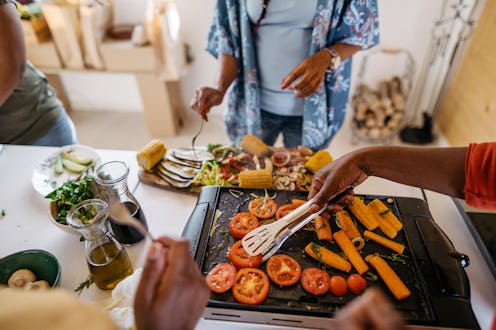Life
The Real Problem With “Clean Eating,” According To Nutritionists

Every January, there's a flood of advice about how to "revamp your diet" and "get healthier" — and if you've come across the vague term "clean eating" and wondered what it means, you're not alone. If you're investigating what clean eating does and whether it's right for you, you may want to exercise some caution: Experts tell Bustle that using "clean eating" as a way to reassess your diet might have short-term positive effects, but it also sows confusion about nutrition, can damage your relationship with food, and risks making eating about hard and fast rules, rather than intuitively giving your body what it needs and enjoys.
"Clean eating" can include everything from eating only whole, non-processed foods to cooking purely from scratch, eliminating all dairy, wheat and sugar, or using paleo or vegan guidelines; following the hashtag #cleaneating on social media shows an enormous variety of approaches. It's important to realize so-called "clean eating" isn't based on any scientific understanding of clean versus "dirty" foods. "The term 'clean eating' is not at all quantifiable, with varying definitions depending on the person — an important reason to be wary of its validity," Emily Fonnesbeck, R.D., a nutrition therapist, tells Bustle. A study published in Journal of Disordered Eating in 2019 found that "clean eating" had many varied definitions, but that people are inclined to think positively about it even when it describes diets that cause "functional impairment and emotional distress."
Tessa Nguyen, R.D., L.D.N., a dietitian and founder of Taste Nutrition, tells Bustle that the foods that are classified as clean often fit very narrow definitions. "Clean eating often means eating a set of very Eurocentric foods that leave out many cultural foods that are nutritionally equivalent to the recommended items," she says. It also often includes only non-GMO, organic, natural foods, she explains, which can be financially inaccessible without any added nutritional benefit. Some of Nguyen's clients, while attempting to eat "cleanly," have simply left out fruit and vegetables because they can't afford fresh, organic varieties. "Frozen, canned and/or dried versions of the same foods are just as nutritious as the fresh versions," Nguyen says — but "clean eating" often excludes them.
Attempting to restrict your food intake to "clean" foods is also potentially damaging to your body in the long term, experts tell Bustle. "Our culture likes to define healthy eating as restrictive eating, but that couldn't be further from the truth," Fonnesbeck says. "Healthy eating is flexible and inclusive of a wide variety of foods." Restricting entire food groups and preparation methods, she says, makes getting adequate nutrition much more difficult, and leaves you at risk of under-eating or of nutrient deficiencies.
Clean eating to the extreme can place the body in a starvation state, Rebecca Jennings, a nutritionist with the Priory Group's Arthur House, an eating disorder treatment center, tells Bustle: "This can cause increased anxiety, irritability, social isolation, withdrawal, tiredness, dizziness, headaches, reduced tolerance to cold, and lots more." Fonnesbeck says that this can also cause a spiral, where people who aren't getting enough nutrition blame these symptoms on "bad" food, and restrict themselves even more.
"Clean eating" can also lead to a punishing, obsessive relationship with food. "Putting these kinds of restrictions in place can set you up to feel guilty or ashamed if, and when, you break a rule," Jennings tells Bustle. She advises that if you find yourself feeling distressed when you eat "bad" foods, avoiding social occasions where there'll be food, and constantly thinking about or planning your food intake, you're risking an unhealthy relationship with the stuff you need to nourish yourself.
If you feel like you're not getting the nourishment you need, a nutritionist can help you figure out a plan that best suits your needs. "I encourage my clients to choose real, whole foods more often," Sara Kahn, M.S., C.N.S., L.D.N., a nutritionist, tells Bustle. "This could include eating more vegetables, fruits, nuts, seeds, legumes, and whole grains. These types of foods will provide more nutrient density and satiety than processed foods." However, moderation and diversity is the key to health, not excluding a whole bunch of foods because they're "dirty."
Nutritionists advise eating different foods and observing how they affect your energy, digestion, sleep, focus, and anxiety, and make choices about your intake based on that. "Don’t set any rules around food, and instead try and connect with your own innate hunger cues," suggests Jennings. There's no one uniform diet that will fit everybody's nutritional needs — so while trying to eat more veggies in the New Year is likely good for you, thinking of foods in terms of "cleanliness" will only be harmful over the long term.
If you or someone you know has an eating disorder and needs help, call the National Eating Disorders Association helpline at 1-800-931-2237, text 741741, or chat online with a Helpline volunteer here.
Studies cited:
Ambwani, S., Shippe, M., Gao, Z. et al. (2019) Is #cleaneating a healthy or harmful dietary strategy? Perceptions of clean eating and associations with disordered eating among young adults. Journal of Eating Disorders 7, 17. doi:10.1186/s40337-019-0246-2
Experts:
Emily Fonnesbeck, R.D., nutrition therapist
Sara Kahn, M.S., C.N.S., L.D.N., nutritionist
Rebecca Jennings, nutritionist with the Priory Group's Arthur House
Tessa Nguyen, R.D., L.D.N., registered dietitian and chef
This article was originally published on